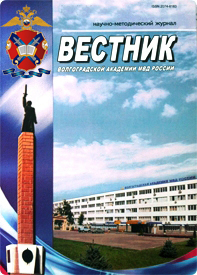In spite of completed reforming of penal-executive system institutions their productive potential has not been raised. Basic problems of productive subdivisions of PES, removal of which would have given positive results, are the following: worsening of quality of components and materials delivered by suppliers; various levels managers poor knowledge of management; shortage of managers; shortage of floating assets; equipment wear; long-term cycle of new products development; low products prices; issue of obsolescent and unprofitable production, etc.; low-skilled personnel. Permanent receipts gained by this sector diversion for replenishment of insufficient financing of budget is a usual practice in PES which leads to permanent deficiency of floating assets for productive structures. Joint work of PES with federal bodies of state power of the Russian Federation is necessary to develop and raise efficiency of PES productive forces. It is necessary to decide an issue on immunity grant to PES, binding the state and municipal customers to place part of orders for production purchase, execution of works, services provision with Penal-Executive System institutions. Necessary are financial funds out of regional and municipal budgets to support on balance of PES objects, providing vital functions of settlements and being city-forming for those settlements (fuel-energy complex objects, objects of medical, social and cultural sector, highways and railroads, bridges, etc.). The aforesaid can not but positively influence development of productive activity of PES institutions.
penal-executive system, penitentiary production, restructuring, ressocialization
1. Matveeva N. Aktual'nye voprosy privlecheniya osuzhdennyh k trudu // Chelovek i trud. 2008. № 9.
2. Teplyashin P. V. Retrospektivnye osnovy i sovremennye problemy vliyaniya mezhdunarodnyh penitenciarnyh standartov i pravil na ugolovno-ispolnitel'noe zakonodatel'stvo Rossii // Yuridicheskaya nauka i pravoohranitel'naya praktika. 2011. № 15. S. 15-25.
3. Grishko A. Ya. Ugolovno-ispolnitel'nyy zakon buduschego: napravleniya reformirovaniya // Yuridicheskaya nauka i pravoohranitel'naya praktika. 2014. № 4. S. 88-93.
4. Medvedev A. V. Sotrudnichestvo ugolovno-ispolnitel'noy sistemy Rossii s religioznymi organizaciyami i obschestvennymi ob'edineniyami v oblasti protivodeystviya korrupcii // Vestnik Volgogradskoy akademii MVD Rossii. 2012. № 2. S. 70-77.
5. Alekseeva A. P. Pravovye posledstviya sudimosti za sovershennoe prestuplenie i vozmozhnosti korrekcii dannogo instituta // Aktual'nye problemy ugolovnogo zakonodatel'stva Rossii na sovremennom etape: sb. nauch. st. vseros. nauch.-prakt. konf. Volgograd, 15-16 maya 2014 g. / otv. red. V. I. Tret'yakov. Volgograd: VA MVD Rossii, 2014. S. 13-16.
6. Krivolapov N. P. O reformirovanii proizvodstvennogo sektora UIS i obespechenii ego ustoychivogo funkcionirovaniya v usloviyah negativnyh yavleniy v ekonomike i finansovoy sfere // Vedomosti UIS. 2010. № 7. C. 2-4.
7. Petrov M. P. Federal'nye organy ispolnitel'noy vlasti: ponyatie i osnovaniya vidovoy differenciacii // Vestnik Volgogradskoy akademii MVD Rossii. 2011. № 4. S. 154-157.
8. Alekseeva A. P. Izmenenie zakonodatel'stva o protivodeystvii prestupnosti: voprosy celesoobraznosti izmeneniya na primere zakonodatel'stva o fizicheskoy kul'ture i sporte // Prestupnost', ee vidy i problemy bor'by / pod obsch. red. A. I. Dolgovoy. M.: Rossiyskaya kriminologicheskaya associaciya, 2011. S. 270-275.
9. Motin A. V. Kontrolling v organizacionno-ekonomicheskom mehanizme upravleniya predpriyatiyami ugolovno-ispolnitel'noy sistemy [Elektronnyy resurs] // Upravlenie ekonomicheskimi sistemami: elektronnyy zhurnal: sayt. URL: http://uecs.ru/uecs-39-392012/item/1177-2012-03-28-06-49-13 (data obrascheniya: 12.09.2015).
10. O Koncepcii razvitiya ugolovno-ispolnitel'noy sistemy Rossiyskoy Federacii do 2020 goda: rasporyazhenie Pravitel'stva RF ot 14 oktyabrya 2010 g. № 1772-r (v red. ot 23 sentyabrya 2015 g.) // SZ RF. 2010. № 43. St. 5544.









